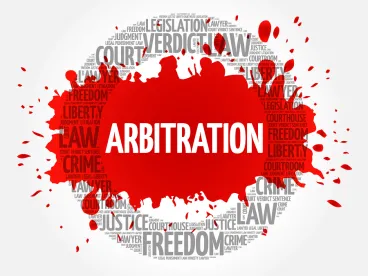The Federal Arbitration Act (“FAA”) reflects a strong federal policy in favor of arbitration. In extraordinary cases, however, a dispute that otherwise would be arbitrable under the FAA could be rendered non-arbitrable by the operation of another federal statute. The right to compel arbitration under the FAA becomes unenforceable when it would conflict with another federal statute such that the very purpose of the other statute would be frustrated. Recently, for example, the Second Circuit held that a bank could not compel arbitration with its cardholder under the terms of its credit-card agreement after a bankruptcy court had issued an order under 11 U.S.C. § 524 discharging the cardholder’s debt.
In Anderson v. Credit One Bank, N.A., 884 F.3d 382 (2d Cir. 2018), the bankruptcy court had released the debtor from all dischargeable debts, including a charged-off credit-card debt (i.e., one changed from a receivable to a loss on the card issuer’s books) owed to defendant Credit One. The card-issuing bank, however, refused to instruct the credit-reporting agencies to remove the debt from the debtor’s credit reports. The debtor then filed a class-action complaint against the bank, accusing it of attempting to coerce payment of a discharged debt by failing to update his credit report. The bank responded by moving to stay the proceeding and to compel arbitration under the terms of the cardholder agreement. The bankruptcy court held that the dispute was non-arbitrable because it was a core proceeding that addressed the “fresh start” guaranteed to debtors under the Bankruptcy Code. Both the district court and court of appeals affirmed.
As the Second Circuit explained, if a proceeding is non-core, bankruptcy courts generally must stay the proceedings in favor of arbitration. But if the matter is core, the bankruptcy court must make a particularized inquiry into the nature of the specific claim and facts of the specific bankruptcy. If the court determines that an arbitration would create a “severe conflict” with the purposes of the Bankruptcy Code, then it has discretion to conclude that Congress intended to override the FAA’s enforcement of the arbitration agreement. Anderson, 884 F.3d at 387.
The Second Circuit held in Anderson that the bankruptcy court properly exercised its discretion to deny the motion to compel arbitration, mainly because (1) the discharge injunction is integral to the bankruptcy court’s ability to provide debtors with the fresh start “that is the very purpose of the Code”; (2) the claim concerned an ongoing bankruptcy matter that required continuing court supervision; and (3) the equitable powers of the bankruptcy court to enforce its own injunctions are central to the structure of the Code. Id. at 390-92.
The Second Circuit addressed only whether there would be an inherent conflict between the FAA and Bankruptcy Code if the arbitration agreement were enforced. Id. at 388-89. The court declined to address whether the text and legislative history of the statutes revealed a Congressional intent to displace the right to arbitrate, because that issue had not been raised below. The court also did not need to address the question of statutory chronology – i.e., whether the result would have been the same if the FAA had been enacted after rather than before the Bankruptcy Code.
Less than three months later, the Supreme Court addressed, in a different context, whether another federal statute trumped the enforcement of an arbitration agreement according to its terms under the FAA. In Epic Systems Corp. v. Lewis, 138 S. Ct. 1612, 1619 (2018), the Court held that the FAA required enforcement of a clause in an employment contract that prohibited class or collective arbitration, notwithstanding the guarantee in Section 7 of the National Labor Relations Act (“NLRA”), 29 U.S.C. § 157, of the right of workers “to engage in other concerted activities for the purpose of collective bargaining or other mutual aid or protection.” One of the rationales for the Court’s decision was that a party seeking to establish that two statutes cannot be harmonized, and that one displaces the other, “bears the heavy burden of showing a clearly expressed congressional intention that such a result should follow.” Id. at 1624 (internal quotations omitted). The Court held that Section 7 of the NLRA, with its focus on the right to organize unions and bargain collectively, does not clearly express a Congressional command to displace the FAA. Id.
Thus, a party claiming that a federal statute displaces the opposing party’s right under the FAA to compel arbitration of their dispute can argue that (1) the other statute is inherently in conflict with the FAA, such that enforcement of the arbitration agreement would frustrate the very purpose of the other statute; or (2) that the other statute clearly expresses the intent of Congress to displace the right to arbitrate. Both Anderson and Epic Systems suggest that these arguments will not prevail absent a particularly strong showing of merit.



 />i
/>i
